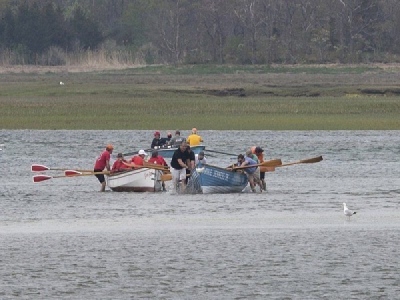
Posted on October 6, 2016
By Sean Horgan, Gloucester Times
There are days when Harbormaster Peter Silva can’t get the town’s largest rescue boat off the dock at the Town Landing because there isn’t enough water at low tide in that stretch of the Essex River.
Those low-tide blues force Silva to Plan B, where he might have to opt for the 15-foot Whaler, or even haul the bigger 23-foot boat to another point on the river where it could be launched.
“Either way, you’re talking about a delay and that’s not good when you’re trying to get to someone in trouble,” said Silva, who also serves as the Essex police chief.
The river, last dredged in 1992, has filled with all manner of sediments that keep the U.S. Coast Guard from deploying to sections of it. The muddy state at low tide also lurks as an impediment to getting boaters to the downtown marinas and restaurants.
Town officials have committed to the quest of once again dredging the Essex River. Their vision for the project came into slightly sharper relief last week, when the U.S. House of Representatives voted to include a bill filed by Congressman Seth Moulton in the chamber’s Water Resources Development Act.
Moulton’s bill, which now must be reconciled in conference with the Senate version filed by Sen. Edward J. Markey, is more procedural than financial, but no less valuable for it.
According to Moulton and Essex officials, the bill eliminates structural encroachments to the federal channel within the Essex River that would prevent the town from dredging the river.
“The bill redesigned the boundaries of the federal channel, eliminating the encroachments by piers, docks, floats and other structures that would be very difficult to relocate,” said Town Administrator Brendhan Zubricki. “Without it, we wouldn’t be able to move forward with the Army Corps of Engineers.”
The town already has been working with the Army Corps of Engineers, which oversees everything related to the federal channel, on tasks such as data collection and sediment sampling.
Now that the encroachment hurdle is cleared, Zubricki said the town will ask the Army Corps to perform a beneficial use study to determine the feasibility of re-using much of the sediments extracted from the Essex River bed.
“The goal is to use them as materials to help rebuild our environment,” Zubricki said. “That way, we wouldn’t have to engage in the usual process of dumping the material at some inland location or far out at sea.”
Possible new uses, he said, include rebuilding clam flats or using the extracted material to create new salt marshes in vulnerable areas along the river. The sand also could have great value.
The beneficial use study will help the town determine the scope and cost of the actual dredging project. Then it will have to identify funding. Zubricki said the federal government is the most likely candidate, though state money also could be used to fulfill the town’s obligation to match funds.
“I was greatly encouraged by the cooperation from everybody involved,” Silva said, singling out Moulton, state Senate Minority Leader Bruce Tarr of Gloucester, the town’s selectmen and the Army Corps of Engineers. “This is so important to the town. From a public safety standpoint it’s critical. Emergencies don’t happen on a schedule. They’re not just at high tide.”
Source: Gloucester Times





